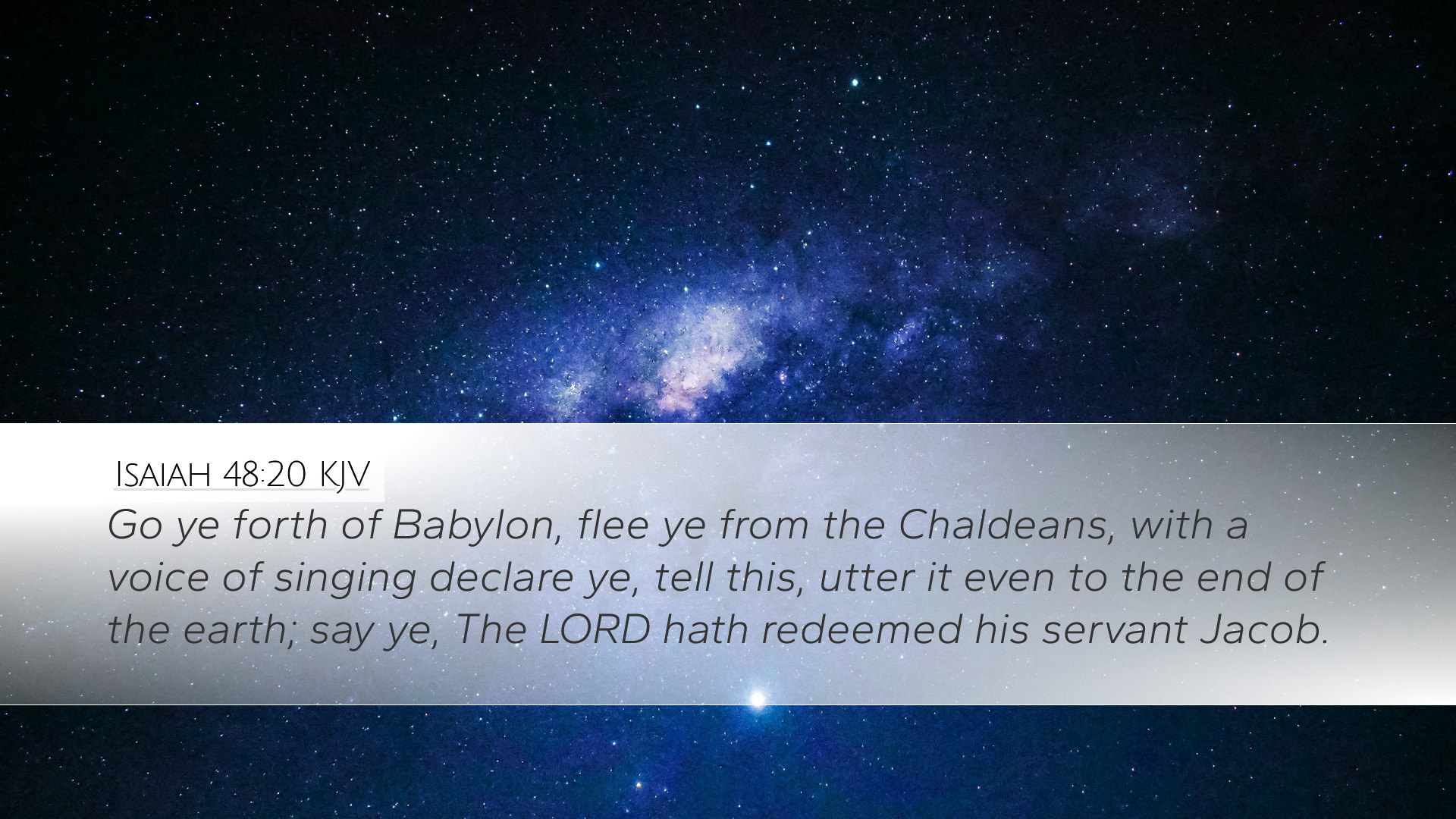Commentary on Isaiah 48:20
Verse: “Go ye forth of Babylon, flee ye from the Chaldeans; with a voice of singing declare ye, tell this, utter it even to the end of the earth; say ye, The LORD hath redeemed his servant Jacob.”
Introduction
This verse from Isaiah captures a significant moment in prophetic literature, emphasizing themes of deliverance and the call to proclaim God's salvation. It serves not only as a historical reflection for the Israelites post-exile but also resonates with contemporary believers in their experiences of liberation and testimony.
Historical Context
Isaiah prophesies during a tumultuous time when Judah faces impending judgment and captivity. The Babylonian exile serves as both a punishment for sin and a catalyst for future redemption. Through this verse, God speaks to His people, encouraging them to leave behind the bondage of Babylon and return to their covenantal identity.
Exegesis and Commentary
-
Call to Action: “Go ye forth of Babylon”
Matthew Henry emphasizes that this command signifies a physical and spiritual departure from the place of bondage. The call to “go forth” reflects God's initiative in redeeming His people, urging them to respond in faith.
-
Exodus from Oppression: “flee ye from the Chaldeans”
Albert Barnes underscores that this flight from the Chaldeans is marked by urgency. The term “flee” indicates a swift and decisive action, highlighting the urgency of leaving the sinful influences associated with Babylon. This has implications for believers today, reminding them to flee from worldly temptations that lead to spiritual captivity.
-
The Proclamation: “with a voice of singing declare ye”
Adam Clarke notes that singing accompanies the declaration of God’s goodness. Worship through song is a significant expression of joy and gratitude in the life of faith, especially as a response to God’s redeeming work. This underscores the necessity of joyfulness in evangelism.
-
Universal Declaration: “utter it even to the end of the earth”
The phrase emphasizes not only the depth of redemption but also its breadth. God’s redemption extends beyond geographical and cultural boundaries. Barnes suggests that the universality of this message is a call for believers to engage in missionary work, proclaiming the Good News to all nations.
-
Theological Implications: “The LORD hath redeemed his servant Jacob”
This declaration encapsulates the essence of redemption. Henry highlights the faithfulness of God in fulfilling His promises to His people, despite their unfaithfulness. It reassures believers that they have been redeemed through grace, which should cultivate humility and appreciation in their service to God.
Thematic Insights
-
Redemption and Deliverance
The themes of redemption are interwoven throughout the Book of Isaiah. Here, the focus lies on God's power to rescind judgment and restore His people.
-
The Call to Worship
Worship is not merely an activity but a lifestyle that should be proclaimed publicly. The directive to sing and declare signifies an active, ongoing expression of faith.
-
Evangelism and Outreach
The command to share the news of redemption to the ends of the earth emphasizes the Great Commission. It urges believers to take an active part in disseminating the message of salvation.
Practical Applications
-
Personal Reflection
Pastors and theologians should encourage their congregations to reflect on their own 'Babylonian' influences that may hinder spiritual growth and joy.
-
Community Worship
Churches might incorporate more communal singing as a means of proclaiming God’s goodness and fostering a collective identity of redemption.
-
Missions Focus
Concerning outreach, local congregations are challenged to engage in mission work, sharing their testimonies and the Gospel message widely.
Conclusion
Isaiah 48:20 not only served as a historical reminder for the exiled Israelites but also continues to challenge modern believers. It calls for an active response to God’s redemption—a response filled with joy, urgency, and a commitment to share God’s work to the ends of the earth. As pastors, students, theologians, and scholars reflect on this verse, may it inspire renewed zeal for personal holiness, corporate worship, and global evangelism.


